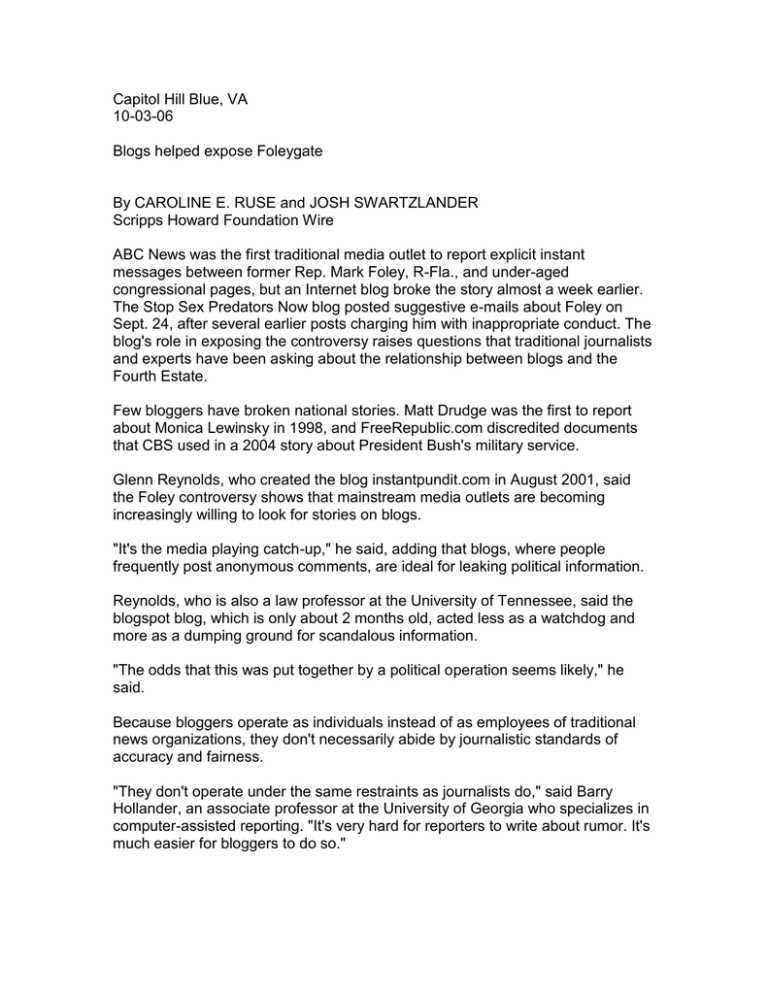
Capitol Hill Blue, VA
10-03-06
Blogs helped expose Foleygate
By CAROLINE E. RUSE and JOSH SWARTZLANDER
Scripps Howard Foundation Wire
ABC News was the first traditional media outlet to report explicit instant
messages between former Rep. Mark Foley, R-Fla., and under-aged
congressional pages, but an Internet blog broke the story almost a week earlier.
The Stop Sex Predators Now blog posted suggestive e-mails about Foley on
Sept. 24, after several earlier posts charging him with inappropriate conduct. The
blog's role in exposing the controversy raises questions that traditional journalists
and experts have been asking about the relationship between blogs and the
Fourth Estate.
Few bloggers have broken national stories. Matt Drudge was the first to report
about Monica Lewinsky in 1998, and FreeRepublic.com discredited documents
that CBS used in a 2004 story about President Bush's military service.
Glenn Reynolds, who created the blog instantpundit.com in August 2001, said
the Foley controversy shows that mainstream media outlets are becoming
increasingly willing to look for stories on blogs.
"It's the media playing catch-up," he said, adding that blogs, where people
frequently post anonymous comments, are ideal for leaking political information.
Reynolds, who is also a law professor at the University of Tennessee, said the
blogspot blog, which is only about 2 months old, acted less as a watchdog and
more as a dumping ground for scandalous information.
"The odds that this was put together by a political operation seems likely," he
said.
Because bloggers operate as individuals instead of as employees of traditional
news organizations, they don't necessarily abide by journalistic standards of
accuracy and fairness.
"They don't operate under the same restraints as journalists do," said Barry
Hollander, an associate professor at the University of Georgia who specializes in
computer-assisted reporting. "It's very hard for reporters to write about rumor. It's
much easier for bloggers to do so."
The St. Petersburg (Fla.) Times knew about the congressman's e-mails as early
as November but could not get the 16-year-old page who allegedly received
Foley's inappropriate e-mails to speak on the record. The paper did not run a
story.
"The journalists had it," Hollander said, "but they weren't confident enough
because the kid wouldn't go on the record and speak, which makes journalists
very nervous."
Ralph Braseth, a blogger and the director of student media at the University of
Mississippi, said blogs are good for casting a wide net to look for sources, but
should be viewed with a skeptical eye.
"One of the reasons blogs are so interesting and problematic and important is
that we often get sources that are simply not on our radar as journalists," he said.
Despite blogs' unreliability, Michael Bugeja, director of the Greenlee School
of Journalism at Iowa State University, said bloggers play an important role in
holding public officials and traditional media accountable.
"Each blogger is not necessarily as important as the network of bloggers, who
raise questions to the point where answers must be provided," he said.
Gilbert Bailon, vice president of the American Society of Newspaper Editors and
editor and publisher of Al Di in Dallas, said bloggers are not journalists but do
influence them.
"I think the distinction has to be made because there is often opinion in blogs,"
Bailon said. "They're not authoritative enough to provide hard evidence, but they
can produce new leads."
Bailon said blogs also pose new problems for journalists, who may be pressured
to report a story gaining attention in cyberspace without checking the facts.
But that pressure is not a new trend, Hollander said.
"Since the early '90s, the tabloids would run a story that traditional media
wouldn't touch," he said. "Once it became part of the public domain, there was
more pressure for mainstream papers to report on it. The Internet and blogs have
simply accelerated the process."
Blogs on Monday continued to post stories that mixed fact with speculation about
Foley.
Many prominent blogs, including the Huffington Post, posted lengthy instantmessage correspondence, including inappropriate sexual content between Foley
and a page.
Wonkette, a blog that bills itself as a "blend of gossip and satire and things the
author makes up," posted pictures of Foley's head superimposed on an alien
from the movie "Battlefield Earth."
It also posted pictures, linked from the Palm Beach Post's Web site, of Foley
smiling with Sen. George Allen, R-Va., under the headline, "Scattered Pictures,
Of the Smiles We Left Behind." Allen is under public scrutiny because of
allegations that he made racist remarks.
Anonymous comments from pages who claimed to know that Foley acted
inappropriately were posted on the blogspot.com site.
One, dated Sept. 21, read: "I am tired of people treating this thing with
Congressman Mark Foley like a joke. It is not funny. He's a danger to any young,
slightly attractive young man on The Hill."
Copyright © 2006 Capitol Hill Blue. All rights reserved



